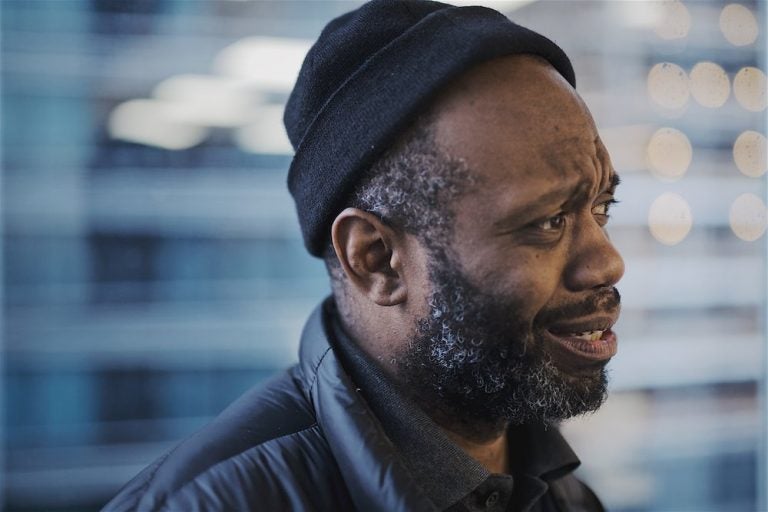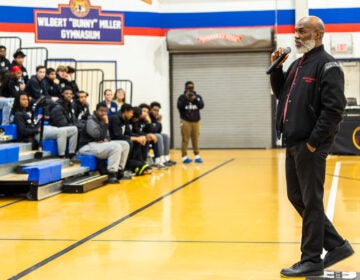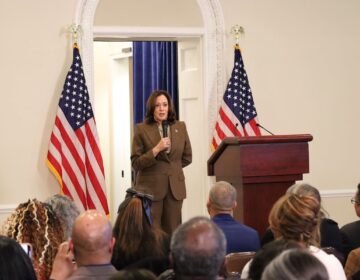Creating my black future from freedom, social impact, and collective good
Black people have always had to project themselves into the future because of the reality of their present. Even today, it takes some cognitive dissonance not to be enraged.

Tayyib Smith is co-founder of Little Giant Creative and the Institute for Hip Hop Entrepreneurship. (Shawn Theodore)
Black History Untold, created by award-winning journalist Sofiya Ballin, is an identity series that explores the importance of a comprehensive black history education through personal essays. WHYY is republishing with permission four essays from the 2018 series “Black History Untold: Future.”
—
Black people have always had to project themselves into the future because of the reality of their present. Even today, it takes a certain level of cognitive dissonance not to be enraged by the constant bombardment of micro-aggressions, the generational warfare of being indoctrinated with a Eurocentric, anti-black historical education system.
Think about Henry “Box” Brown. He theoretically and physically time-traveled. He shipped himself into the future. He hacked the system and he projected himself into freedom. From Virginia to Philadelphia prior to emancipation.
That’s time travel.
He was a gifted master carpenter, orator, and magician.
You don’t see or hear of that type of genius from our people in American history because almost everything we’ve been told, taught, or seen is mostly myth via constructs of the white supremacist revisionist lens.
If you think about people like Harriet Tubman and Sojourner Truth, they manipulated existing systems or even placated the arrogance of white supremacy that did not believe that black people would even have the capacity to organize something they couldn’t see. It was as invisible as the true meaning and narrative of Negro spirituals.
That goes into the whole history of call-and-response choruses, hymns, gospel, spiritual music — from the church to the juke joint — that told a message and gave you a pathway toward freedom, and you had to be in the narrative to know. That freedom could also be momentary, but it elevated you out of the pain or your reality of the present.
It’s like the quote from Octavia Butler: “I am my ancestors’ wildest dream.”
We live a reality every day that is beyond imagination. We are that time’s fiction. Our ancestors in even recent history could never imagine the agency and ability many of us have today; far from enough of us, but nonetheless enough to do more collectively.
I was joking with someone last week and asked, “What would Sojourner Truth do with an iPhone?”
Ask yourself that question in regard to closing the wealth, health, and security gap in our community — locally, regionally, and internationally. What are we doing to further progression?
Viewing yourself through a white lens of history is something you have to constantly shake yourself out of. The images that are marketed to us are very rarely black-owned, and it’s a form of intellectual warfare. Optimistically, I would hope that sometime in the future, we would be able to talk about blackness outside a sense of struggle. Generations past my own, I hope that we will be able to create from a space of offense as opposed to defense.
My black future is creating from a space of freedom, using optics and images from a pre-Colonial past, postmodernism, and futurism to project a more utopian future vs. our dystopian present.
The Institute of Hip-Hop Entrepreneurship is a manifestation of myself and my partner Meegan Denenberg. We’re trying to enlighten people by providing resources, a network, and a learning tree. The Dream Deferred Project is using technology to tell the history and contemporary times, and also reimagine the future. Most people will probably say that I should spend a lot more time focusing on things that would put me in a different tax bracket, more security, and more material. I believe in social impact and collective good. As a company and team, the people we work with, hire, or subcontract speak the reality that we imagine, into the now.
The future for the black diaspora is all about safe spaces where Langston Hughes’ deferred dreams do not burst or explode; they ripen on strong mahogany vines that bear rich fruits no longer considered strange.
—
Tayyib Smith is co-founder of Little Giant Creative and the Institute for Hip Hop Entrepreneurship.
WHYY is your source for fact-based, in-depth journalism and information. As a nonprofit organization, we rely on financial support from readers like you. Please give today.




